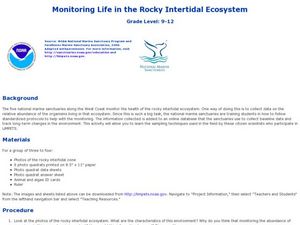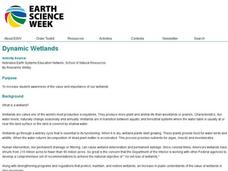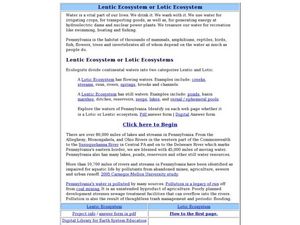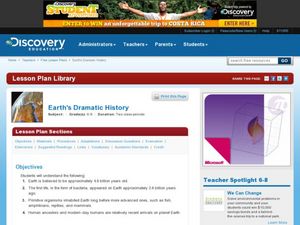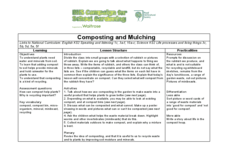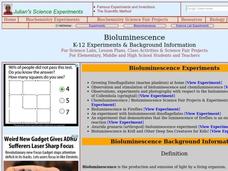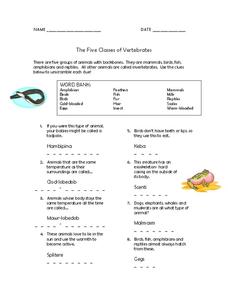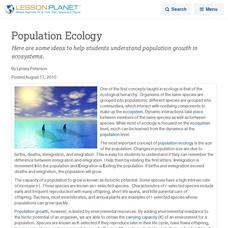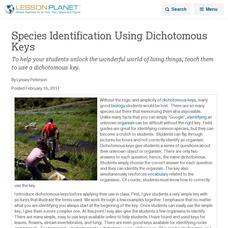Curated OER
Recycling Blackout Worksheet
In this recycling vocabulary activity, students read 15 clues that include both a definition and word puzzle. Students must decide what recycling word the definition and puzzle describes and write the word on the line provided.
Curated OER
Monitoring Life In The Rocky Intertidal Ecosystem
High schoolers investigate marine life by researching aquatic organisms on the Internet. In this oceanography lesson, students monitor algae and animals of the ocean by identifying their population and habitat on data sheet ID cards....
Curated OER
Dynamic Wetlands
Students construct and observe a model of two different types of wetlands. In this wetlands lesson plan, students create a model of a wetland with constant drainage and a wetland that maintains a well-saturated soil. Students observe and...
Curated OER
Lentic Ecosystem or Lotic Ecosystem
Students explore the differences between lentic and lotic ecosystems. In this ecology lesson students study the water systems in Pennsylvania.
Curated OER
Mammals of Fields, Meadows, and Hedgerows
In this mammals instructional activity, learners research the internet to find information and answer short answer questions about mammals of fields, meadows, and hedgerows. Students complete 12 questions.
Curated OER
The Sponges
In this sponge worksheet, students read about the different parts of a sponge and answer 20 short answer questions that follow. They color and label different sponge drawing.
Biology Junction
Cnidarians
In this cnidarian worksheet, learners study the biology of the different species of cnidarians and complete a series of questions.
Biology Junction
Flatworms
In this flatworms instructional activity, students identify and color the different parts of a flatworm. They complete 14 short answer questions related to the topic.
Curated OER
Earth's Dramatic History
Middle schoolers create a timeline. In this Earth's History lesson, students research the history of life on Earth and use the information collected to create a timeline. Middle schoolers also answers the provided discussion questions.
Curated OER
Forest Ecosystem
Students become familiar with the temperate rainforest. In this forest ecosystem lesson, students identify the producers, consumers and decomposers in the forest ecosystem. Students sort cards and identify the trophic level of the...
Curated OER
Worm Composting
Second graders discuss worm composting. In this decomposition instructional activity, 2nd graders look at the anatomy of the worm and how it eats food. They have their own worm bin and review what foods can and can not be given to the...
Curated OER
What is Coral?
Students discuss what they know about coral reefs and are introduced to the importance of preserving coral reefs. In this coral reef instructional activity, students make connections between coral ecology in the classroom and in the real...
Curated OER
Crustacean Critters
Students explore the habitats of hermit crabs. In this crustacean lesson, students discover what animals need to survive. Working with live hermit crabs, students explore how hermit crabs have adapted to their habitats.
Curated OER
Composting and Mulching
Second graders define composting and recognize what can be composted. In this composting and mulching lesson, 2nd graders classify objects or pictures as good or bad for composting. Students write a story about life in the compost heap.
Curated OER
Bioluminescence
Students differentiate chemiluminescence from bioluminescence. In this biology lesson, students explain how fireflies and other animals emit light. They discuss the applications of engineered bioluminescence.
Curated OER
The Five Classes of Vertebrates
For this vertebrates classification worksheet, 5th graders unscramble 15 words to find answers to clues. Each clue gives information about the characteristics of vertebrates.
Curated OER
Population Ecology
Here are some ideas to help students understand population growth in ecosystems.
Curated OER
Species Identification Using Dichotomous Keys
To help your students unlock the wonderful world of living things, teach them to use a dichotomous key.
Curated OER
Internet Challenge Worksheet
In this Internet worksheet, students go to 5 specific sites and answer the questions about how many matches they get. No information or research is done here.
Curated OER
Reviving Celery
The classic in-class demonstration using celery dipped into water with food coloring is the highlight of this biology lesson plan. Young scientists discover that organisms are made up cells and have distinguishing characteristics. After...
Curated OER
Crab Lab
Students participate in an activity in which they observe the behavior of a crab. In groups, they label and identify the function of each main part while observing and record their behavior. They make educated guesses on why they...
Curated OER
Making a Taxonomic Key
Students work as a team of abalone taxonomists who examine and classify abalones based on their shell characteristics of the four most common species. They also study the visible details of each species shell, make notes and eventually...
Curated OER
Bug Hunt
Students examine the different characteristics of bugs in their local area. They take characteristics of bugs they have observed and create their own new insect. They draw their new bug and share it with the class.
Other popular searches
- Invertebrates and Vertebrates
- Marine Invertebrates
- Invertebrate Worksheets
- Invertebrates Vertebrates
- Vertebrates an Invertebrates
- Vertebrate and Invertebrates
- Benthic Invertebrates
- Invertebrates Research
- Invertebrates + Vertebrates
- Invertebrate Phylum
- Invertebrate Classification
- Invertebrate Sponge



